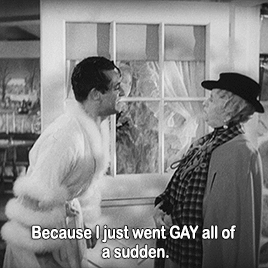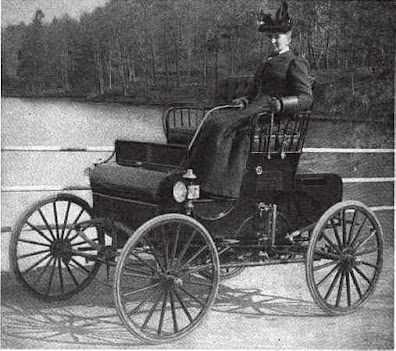A Wife in Every Room
In Bringing Up Baby, Cary Grant became the first person to use the word Gay (in its modern sense) in a Hollywood movie. One might hypothesize that by 1938, the film censors were starting to become more permissive about the subtext that was regularly being slipped into films of the era.
One would be completely wrong to thusly hypothesize (to hypothesize thusly; excuse me). Film censorship in the late 1930s was just as draconian as ever: a year earlier they had insisted that a shot of a gravestone be cut from a film because the character in question had committed suicide, and it was "inappropriate" to show her receiving a proper burial. The word gay had only slipped through in Bringing Up Baby because no one at the Hays Office knew what it meant in that context. (I won't tell them if you don't.)
Cary Grant certainly knew what it meant, and it's very interesting that he was the one who got to introduce the word to American film audiences. Because Cary Grant, that dashing matinee idol and iconic heart-throb of the silver screen, may have been in a long-term relationship with all-American leading man Randolph Scott.
I say "may have been" because there is no consensus about just how physical their relationship was. They were certainly devoted to each other, and they lived together for about 12 years, sparking all sorts of rumours (which they very happily encouraged). They spoke of each other in loving and devoted terms, and were, in some ways, Hollywood's earliest "celebrity gay couple".
So, when the two of them finally got to appear in a film together, it was inevitable that the "sexual subtext" of that film was going to be... shall we say... interesting.
"To the YMCA!"
Setting aside all the Hays Office rules about sex before marriage (no no no!) or sleeping in the same bed together (don't even think about it) there were a couple of completely inflexible rules that were drilled into the heads of every writer and director in the film industry. First: never show an army officer having an affair with a 12 year old girl (we'll come back to that one in due course) but only slightly less well known:
Never, never make a film about a man who cheats on his wife during their honeymoon while secretly harbouring homosexual fantasies about his first wife's lover.
Oops!
In 1864, Alfred, Lord Tennyson published a narrative poem entitled Enoch Arden about a fisherman who is lost at sea (presumed dead) for years and eventually returns to find his wife re-married. In 1940, the husband and wife writing team of Sam & Bella Spewack decided this would be a perfect vehicle for Cary Grant.
My Favorite Wife takes the basic premise of Enoch Arden and reverses the genders. Thus, Irene Dunne is the intrepid wife who has been stranded on a desert island for the last seven years, only to be rescued and eventually returned to her devoted (but re-married) husband.
As a screwball comedy, My Favorite Wife is a textbook example of Hollywood's ability to dance on the edges of the censorship code. But this one goes significantly deeper than usual. While the film was in pre-production, director Leo McCarey was hospitalised after a near-fatal car crash, and Garson Kanin was brought in to replace him.
The car crash had been so severe that no one expected McCarey to survive, and everyone involved in the production was trying to make a light, fluffy comedy while waiting for the phone to ring with news that their friend and colleague had died.
Happily, McCarey did not die (he ultimately lived for another three decades) but the uncertainty and conflicting emotions on the set had an unexpected impact on the final film.
Whatever this film might have been in the planning stages, Leo McCarey's near-death experience seems to have galvanised everyone involved, and as a result the whole film is practically on fire. When you're trying to make a comedy while a close friend is on life support, the last thing you are thinking about is some pencil-pusher from the Hays Office.
So, yes. My Favorite Wife is insane. It's bonkers. And it takes risks that very few other films of the era would have taken (apart from one film that we'll be showing in a few weeks; watch this space).
But it also manages some very genuine pathos and, of course, it's very, very funny.
And yes, the "YMCA" reference means exactly what you think it means; even in 1940.
We will be screening My Favorite Wife at 7.30pm on Thursday, the 25th of April at the Victoria Park Baptist Church.

















Comments
Post a Comment